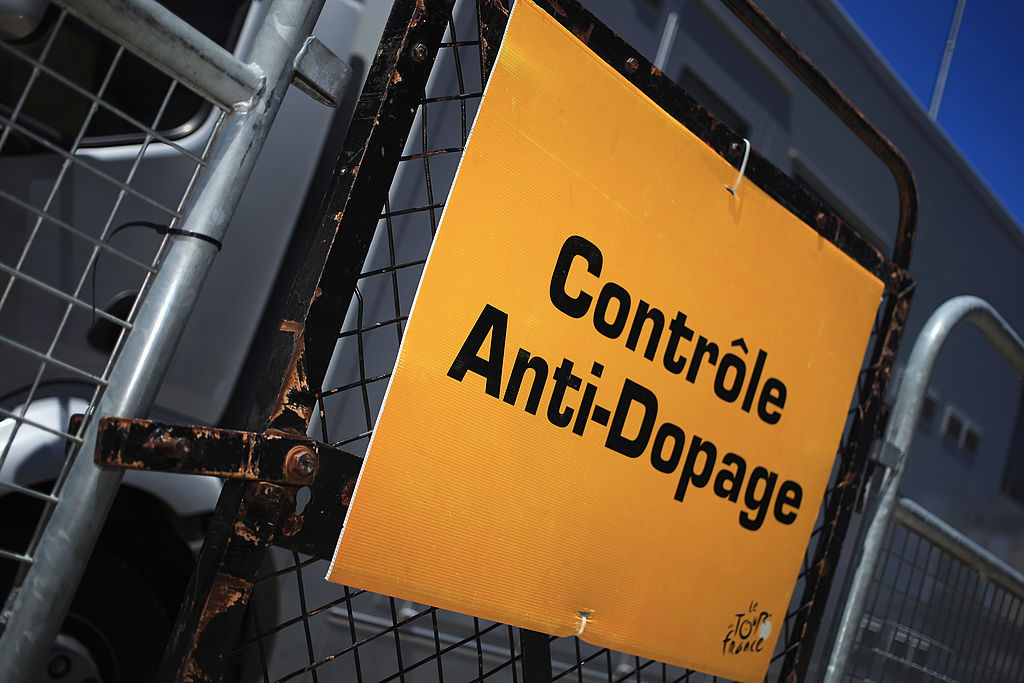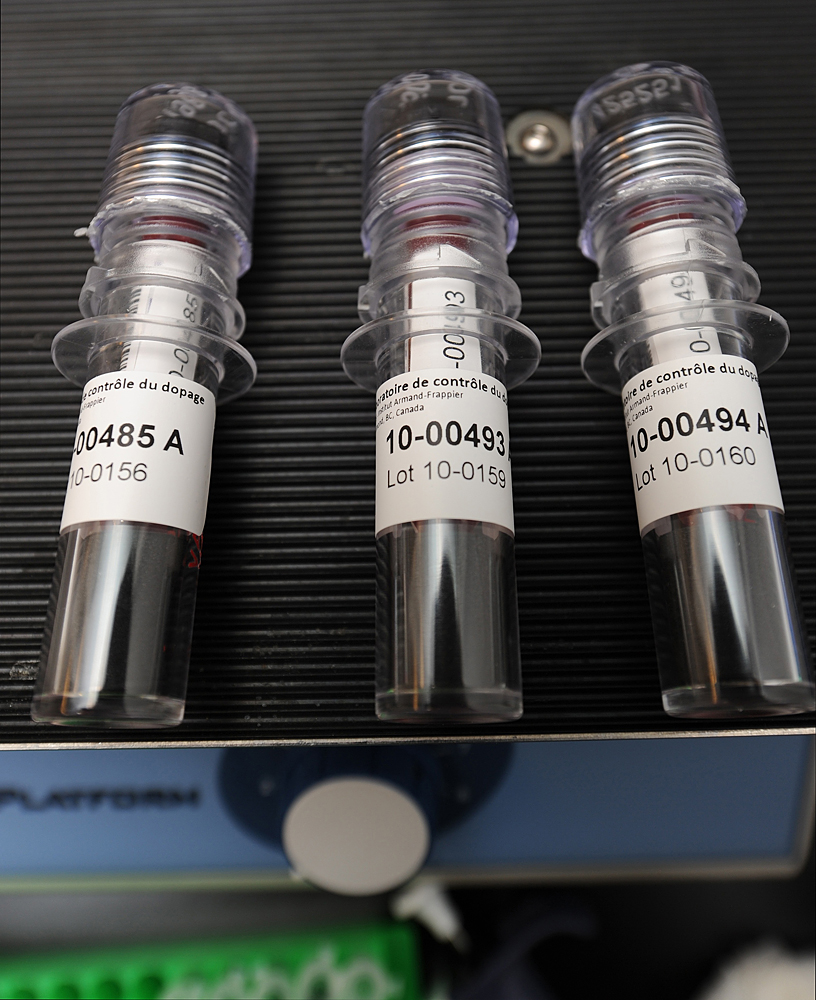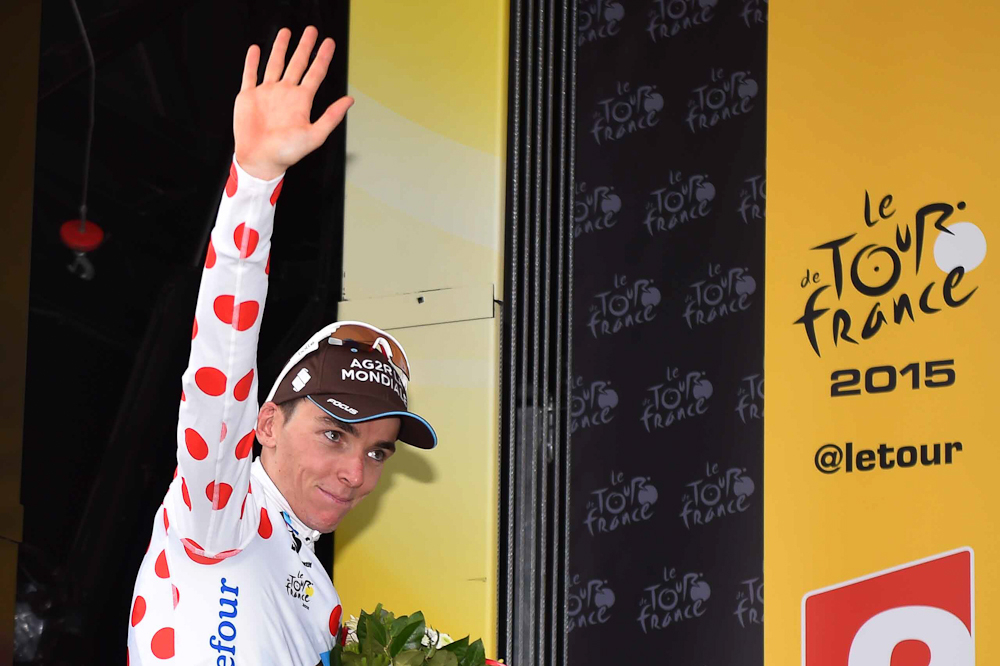Testing times: Anti-doping reckons with the coronavirus crisis
CADF anticipates 'a shortfall in funding' due to race cancellations and postponements

For Romain Bardet, it's been "an eternity" since the last time. "I'd prefer not to tell you when," he wrote in Le Monde last week. "A long time before the lockdown." For Thibaut Pinot, there's been nothing since October. For Tom Dumoulin, there hasn't been a knock on the door "in months".
The suspension of bike racing in March due to the coronavirus pandemic was mirrored by an interruption to regular out-of-competition doping controls. It could hardly have been otherwise, given the lockdowns, social distancing protocols and travel restrictions imposed around the world, while the services and expertise of many sample collectors have been required elsewhere to test for COVID-19.
The widespread shortage of protective equipment during the coronavirus pandemic has also had an effect on the number of anti-doping controls. In France, for instance, the AFLD donated much of its stock of face masks to frontline medical workers in hospitals, which has further restricted its ability to test during the lockdown.
Coronavirus: UK Anti-doping with 'significant reduction' in testing
WADA monitoring anti-doping testing gaps as coronavirus locks down entire countries
Coronavirus: Riders told to update anti-doping Whereabouts during lockdown as CADF aims to continuing testing
USADA begins pilot program for self-administered anti-doping tests
France TV reported earlier this month that the AFLD had ceased carrying out blood tests altogether during the crisis and was, at most, limited to attempting to carry out occasional targeted urine tests. In Ireland, Sport Ireland admitted there was a "significantly reduced level of [anti-doping] activity" but insisted it remained "in a position to act on any intelligence received".
Yet while the reduction in anti-doping controls – or their complete absence, as seems to be the case in some jurisdictions – was only to be expected in a time of pandemic, the consequences of such a lack of surveillance have been noted with growing concern by some riders.
The issue is all the more pressing now that the UCI has sketched out contingency plans for competition to resume in late summer – subject, of course, to the easing of the coronavirus restrictions currently in place in Europe.
Pascal Chanteur, the head of the French professional riders' union, lamented recently that his members have been disadvantaged relative to peers elsewhere by not being able to train outdoors during the lockdown. Nans Peters (AG2R La Mondiale), for his part, seemed rather more preoccupied by how the playing field might be skewed by the obvious gaps in anti-doping testing in France and elsewhere during the coronavirus pandemic.
Get The Leadout Newsletter
The latest race content, interviews, features, reviews and expert buying guides, direct to your inbox!
"In this period of lockdown, there are no controls!!!!" Peters wrote in a blog post earlier this month. "Let's not be naïve: there is still doping. Fortunately, there's a lot less than there was from 1995-2005, but it's still there.
"So do the cheats have free rein at the moment? It's as though someone said to us: 'Do you want to cheat? Go ahead! Now is the time. Train like crazy, you have until May 11 [the end of the current lockdown period in France – ed.] to make your motor bigger and crush everybody when you get back to competition.' I'm afraid for my sport, my passion and the end of my season against such mules."
Peters' blog post was published more than three weeks after the Cycling Anti-Doping Foundation pledged "to protect clean cycling in the context of the coronavirus pandemic", although the statement was decidedly light on specifics. Riders were reminded to keep updating their whereabouts and the CADF said that priority would be given to "elite-level riders in the UCI Registered Testing Pool".
Last week, one of those elite-level riders, Victor Campenaerts (NTT), highlighted the ongoing paucity of controls being conducted by all agencies right now in an interview with Het Nieuwsblad, claiming that he had asked to be tested by both the Belgian and Flemish anti-doping bodies, but neither could fulfil his request. A USADA pilot programme, whereby 15 athletes volunteered to take and send their own samples for testing, meanwhile, had all the appearances of a publicity stunt rather than a serious solution to the problem.
Cyclingnews contacted the Cycling Anti-Doping Agency for a more detailed update on the current state of drug testing in cycling and the impact of the coronavirus pandemic on anti-doping in the weeks and months ahead. CADF director Olivier Banuls was not made available for a telephone interview, but a CADF spokesperson responded to a series of questions via email.
Testing

From the comments of Bardet, Pinot, Dumoulin et al, it would appear that out-of-competition controls and biological passport sampling for those in the registered testing pool have effectively ground to a halt since the middle of March, when the COVID-19 pandemic interrupted the cycling season.
In an interview with L'Équipe on Tuesday, Chris Froome (Team Ineos) confirmed that he hadn't been tested at home in Monaco since the lockdown began on March 17, although he added: "I know that some tests are still taking place."
The CADF spokesperson told Cyclingnews that it had conducted its anti-doping programme "normally" until March 15 and said that the information collected up to that point "will be useful when competitions resume". When asked specifically to compare the number of out-of-competition tests conducted between March 15-April 15, 2019, with the same period this year, however, the CADF limited itself to confirming that "the current situation has a significant impact on the number of tests conducted today".
As for whether it is possible to perform any out-of-competition controls while lockdown and social distancing measures remain in place, the CADF said: "It is possible but only with the maximum care and taking into consideration the governmental public health measures in place."
Over the past six weeks, the majority of riders from WorldTour and Pro Continental teams have been based in areas where lockdown measures of varying severity are currently in force, namely in Western Europe, North America and South America.
Asked if out-of-competition testing was currently possible in any countries, the CADF spokesperson said: "It would be inaccurate to assume that testing has come to a standstill. In line with the World Anti-Doping Agency's requirements, athletes included in the UCI RTP [registered testing pool] are still required to submit and update their whereabouts information. Consequently, they can be tested at any time during the COVID-19 pandemic, in areas where no physical contact restrictions have been put in place by local authorities."
Even if sample collection has not ceased altogether, it has clearly been scaled back to the bare minimum, but that is not the only obstacle to anti-doping efforts during the coronavirus pandemic. The testing of samples from all sports has also been reduced, given that so many laboratories have been either running at reduced capacity or been closed altogether in recent weeks.
Of the 30 WADA-accredited laboratories around the world, 13 – Rio de Janeiro, Montreal, Paris, Havana, London, Rome, Doha, Bloemfontein, Bucharest, Barcelona, Madrid, Ankara and Los Angeles – have reported that "operations may temporarily be disrupted due to COVID-19". The Rio and Bloemfontein labs are the only WADA-accredited facilities in South America and Africa, respectively.
A further three labs – Athens, Bangkok and New Delhi – were already suspended for failing to conform with international standards, while the Helsinki lab is also out of operation while it relocates to a new facility.
Testing before the Tour?

Estimating precisely when anti-doping can return to normal is an impossibility given that it will be contingent on when the lockdown, travel and social-distancing measures to combat COVID-19 are eased. It is more appropriate, perhaps, to consider what conditions need to be in place for out-of-competition controls to resume in earnest.
The UCI and ASO are hoping that the restrictions will ease sufficiently by late summer to allow the postponed Tour de France to take place from August 29 to September 20. That still-hypothetical Grand Départ is now just four months away, and it is as yet unclear if adequate worldwide testing can resume before then, although the CADF spokesperson noted that out-of-competition "will have to recommence" ahead of the peloton's eventual return to action.
"We usually monitor athletes throughout the season, taking into account the riders' programme provided by the teams," said the CADF spokesperson. "As mentioned before, we have already collected data for the first quarter of the season. COVID-19 has shortened the competition period for all athletes. Therefore, the CADF testing programme will also be concentrated on a shorter period.
"We are closely monitoring the updates to the UCI calendar to try to anticipate as far as possible what our future testing programme will be. OOC Testing will have to recommence before competitions resume but there are questions we still don't have the answers to. In essence, the sooner we can restart testing the athletes consistently, the better.
"That said, Athletes' Biological Passport (ABP), intelligence and investigation are also other critical tools we're relying on to mitigate the impact of the pandemic on testing operations. With the ABP, samples collected post-COVID-19 may indicate the use of prohibited substances or methods that took place during the period."
It is notable, however, that only one active WorldTour or Pro Continental rider – Jaime Rosón – has been sanctioned for biological passport irregularities since the UCI dropped proceedings against Roman Kreuziger following a legal challenge in 2015. The Operation Aderlass blood doping inquiry of 2019 raised further uncomfortable questions about the current efficacy of the biological passport, although WADA later claimed that the blood profiles of seven of the implicated athletes had been flagged as suspicious.
The CADF has had a partnership with the Sportradar intelligence and investigations service since the end of 2018. A Sportradar dossier on Jakob Fuglsang and Alexey Lutsenko's alleged links to Dr. Michele Ferrari – which both riders denied – was leaked to the Danish press earlier this year, but the CADF opted not to open disciplinary proceedings.
At best, the use of biological passport data and intelligence gathering will serve only to mitigate in part for the current gap in testing during the COVID-19 pandemic. Romain Bardet articulated his concerns in his ongoing lockdown diary in Le Monde.
"I just hope we can have a certain equity in the controls from now to the start of the race," he wrote. "There's a certain amount of anxiety and uncertainty about it, and that's the issue with the resumption of competition: all the conditions need to be in place."
Not just 2020: funding a future concern
As well as the immediate impact on the remainder of the 2020 season, the COVID-19 pandemic is set to have far-reaching consequences for professional cycling in the years ahead. Just as the ongoing pandemic ensures there can be no guarantee that competition will resume before the end of 2020 – on Tuesday, French prime minister Edouard Philippe cast further doubt on a September Tour de France – there is no certainty that out-of-competition testing will return to capacity this year either.
Regardless of when competition does resume, the economy of professional cycling looks set to shrink in 2021 and beyond. Several WorldTour teams have already imposed salary cuts and laid off staff, while race organisers are counting the cost of a spate of cancellations. Anti-doping efforts will inevitably be affected by the more straitened circumstances of cycling and sport at large.
The CADF is funded by the UCI, but also by professional teams and race organisers – an arrangement that will continue in 2021 when the CADF's functions (and much of its staff) are absorbed by the new cycling unit of the ITA, the testing agency created by the IOC in 2018.
WorldTour teams each make a contribution of €134,744 per season towards the biological passport, paid in three instalments on January 31, June 1 and August 1. Pro Continental teams contribute €90,203 each, also paid in three instalments. Every WorldTour race organiser must currently pay a contribution of 17.51% of its prize money to the CADF.
The empty racing calendar, not to mention the recent cutbacks enacted at the UCI itself, will inevitably have an impact on the CADF's balance sheet in 2020 and, most likely, that of the ITA cycling unit in 2021.
"Cycling's stakeholders are facing financial difficulties in the current context of inactivity imposed by the pandemic. We're anticipating a shortfall in funding for the CADF in relation to the fact that several UCI WorldTour events were unable to go ahead at the scheduled dates," said the CADF spokesperson. "We will have a better understanding of the extent to which our budget and our activities will be impacted once we know when the season resumes."
For the anti-doping movement, the testing times may only be beginning.

Barry Ryan was Head of Features at Cyclingnews. He has covered professional cycling since 2010, reporting from the Tour de France, Giro d’Italia and events from Argentina to Japan. His writing has appeared in The Independent, Procycling and Cycling Plus. He is the author of The Ascent: Sean Kelly, Stephen Roche and the Rise of Irish Cycling’s Golden Generation, published by Gill Books.